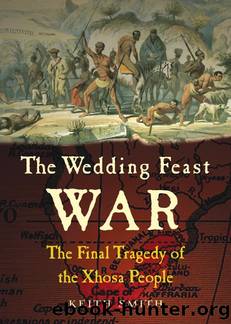The Wedding Feast War: The Final Tragedy of the Xhosa People by Keith Smith

Author:Keith Smith
Language: eng
Format: epub
Tags: Bisac Code 1: HIS037060: HISTORY / Modern / 19th Century
ISBN: eBook ISBN: 9781783376704
Publisher: Frontline Books
Published: 2012-12-19T00:00:00+00:00
Opinions in the colony were divided on Maphasaâs defection: Brownlee felt that it was a positive step because it indicated a split in the Gcaleka leadership and might discourage other chiefs from joining Sarhili. Others were not so sure, fearing that Maphasaâs treachery might cause trouble in the colony. Cunynghame was among the latter and strongly advocated Maphasaâs disarmament, a step which Brownlee was able to delay for a short time.19
Maphasa was soon joined by Makinana (known to the British as Mackinnon), a son of the Ndlambe chief Mhala and the brother of Ndimba and Smith Mhala (yet another African named after Sir Harry), bringing with him a mere fifty or sixty warriors.
By mid-November, Gcalekaland had been supposedly cleared by Griffith and steps were being taken to relocate Maphasa and his people there. This came as a welcome relief to their white neighbours, who had found their livestock numbers being rapidly depleted. The Tsonyana were allocated an area between the Qora and Shixini rivers.20
Sir Bartle Frere, who had agreed with Cunynghame, ordered that the Tsonyana be disarmed before being moved to their new location and Brownlee was despatched to Impetu to make the arrangements. Inspector Hutchison, second-in-command of the FAMP, was deputed to give effect to the disarmament order with his troop of police.
When Brownlee arrived at Impetu on 15 November the Tsonyana had had time to consider their position. It was not a comfortable one. Maphasa argued with Brownlee that he had left Sarhili so that, with the paramountâs defeat, he and his people might return to their own country in safety. Now he was to be re-settled in the midst of hostile Gcaleka and, worse, was to be deprived of the means to defend himself. Brownlee was implacable and Maphasa, with great reluctance and misgiving, eventually had to acquiesce.21
Before the war began, Makinana had several times requested permission to relocate from Gcalekaland to be near his brother Ndimba, situated in the south of the Ngqika location in the colony. Despite Sarhiliâs support for the move, Brownlee had turned his requests down. Now, not only was he to be sent back to Gcalekaland, but he was to be disarmed and, because he had chosen to accept 250 of Maphasaâs men, he was to pay a part of the cattle fine imposed on Maphasa. The situation, he felt, was intolerable, and he again appealed to Brownlee to be allowed to settle with his own people. Brownlee curtly told him to do as he had been told.22
As part of the disarmament process, a German volunteer, Baron Wilhelm von Linsingen (of whom we shall hear more) had over-zealously searched the huts of the Ndlambe, finding three firearms which he had confiscated.23 Makinana and his people became extremely alarmed, fearing that their disarmament would be the prelude to the seizure of their cattle and perhaps their own massacre. On the pretext of looking for lost cattle, Makinana then sought, and was given, a pass permitting him to go to Ndimbaâs location. In dead of night, he and his people fled from Impetu to his brotherâs location near Draaibosch.
Download
This site does not store any files on its server. We only index and link to content provided by other sites. Please contact the content providers to delete copyright contents if any and email us, we'll remove relevant links or contents immediately.
| Central Africa | East Africa |
| North Africa | Southern Africa |
| West Africa | Algeria |
| Egypt | Ethiopia |
| Kenya | Nigeria |
| South Africa | Sudan |
| Zimbabwe |
Goodbye Paradise(3810)
Men at Arms by Terry Pratchett(2836)
Tobruk by Peter Fitzsimons(2516)
Borders by unknow(2313)
Arabs by Eugene Rogan(2299)
Pirate Alley by Terry McKnight(2221)
More Than Words (Sweet Lady Kisses) by Helen West(1867)
Belonging by Unknown(1855)
It's Our Turn to Eat by Michela Wrong(1730)
The Biafra Story by Frederick Forsyth(1656)
The Source by James A. Michener(1613)
Botswana--Culture Smart! by Michael Main(1601)
Coffee: From Bean to Barista by Robert W. Thurston(1544)
A Winter in Arabia by Freya Stark(1538)
Gandhi by Ramachandra Guha(1531)
The Falls by Unknown(1525)
Livingstone by Tim Jeal(1489)
The Shield and The Sword by Ernle Bradford(1409)
Africa: Altered States, Ordinary Miracles by Richard Dowden(1384)
